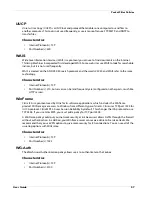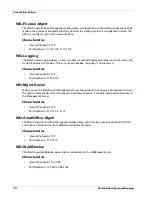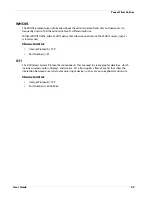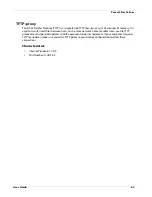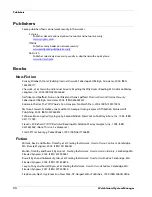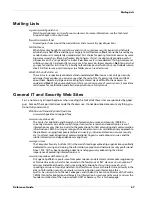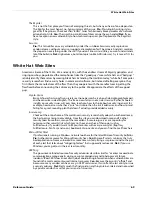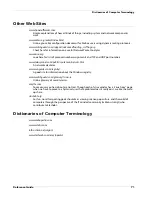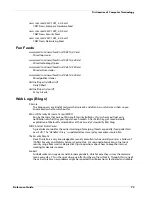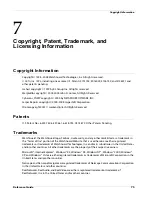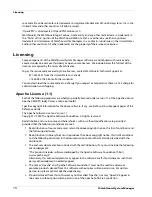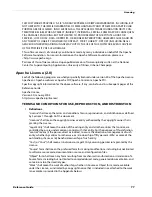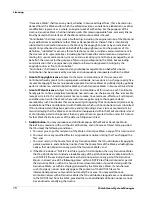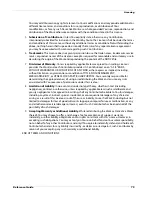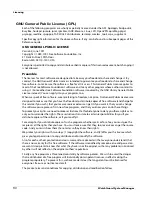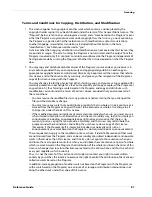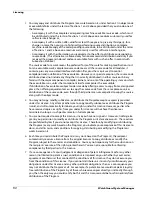
Reference Guide
67
Mailing Lists
Mailing Lists
wg-users@watchguard.com
WatchGuard sponsors a listserv for our customers. For more information, see the Technical
Support chapter in the
User Guide
.
firewall-wizards@nfr.net
Firewall gurus from around the world discuss and answer all types of questions.
Full Disclosure
When Symantec bought Security Focus and its lists, suspicious security experts and network
administrators fled. Where did they go? Largely to Full Disclosure.
Pros
: Cannot be biased by any
vendor because it's completely unmoderated. First choice for posting latest discoveries by some
big-name researchers. Black-hat hackers like to harass this list, inadvertently providing useful
perspective on the "script kiddie" mindset.
Con
: Because it's unmoderated, this high-volume list
will drown you in 20 irrelevant flame-war e-mails for every on-topic comment.
Net:
You get what
you pay for, and this list is free. Try it briefly to familiarize yourself with it, but use Outlook rules to
divert Full Disclosure e-mail messages to a folder you can read at leisure.
VulnWatch and VulnDiscuss
These lists are, respectively, moderated and unmoderated.
Pro:
You can not only get security
advisories from vendors, you can also see what the rest of the IT community thinks and feels
about them.
Con:
Fairly large volume of highly technical alerts difficult for newcomers to
understand.
Net:
While you wouldn't want this as your only source of security news, it provides a
solid source for confirmation and alternate opinions on security trends.
General IT and Security Web Sites
First, a note to any intrepid beginner who is reading this: Not all of these sites are sponsored by good
guys. Some of them post malicious code that hackers use. Do not download or execute anything you
do not fully understand.
WatchGuard Frequently Asked Questions
www.watchguard.com/support/faqs
www.cerias.purdue.edu/
The Center for Education and Research in Information Assurance and Security (CERIAS) is
currently viewed as one of the world’s largest centers for research and education in areas of
information security that are crucial to the protection of critical computing and communication
infrastructure. CERIAS is unique among such national centers in its multidisciplinary approach to
the problems, ranging from purely technical issues (e.g., intrusion detection, network security,
etc.) to ethical, legal, educational, communicational, linguistic, and economic issues, and the
subtle interactions and dependencies among them.
www.gocsi.com
The Computer Security Institute (CSI) is the world's leading membership organization specifically
dedicated to serving and training the information, computer and network security professional.
Since 1974, CSI has been providing education and aggressively advocating the critical
importance of protecting information assets.
www.cerias.purdue.edu/homes/spaf/
Dr. Eugene Spafford is a professor of computer sciences and electrical and computer engineering
at Purdue University, where he has served on the faculty since 1987. He serves on a number of
advisory and editorial boards, and is internationally-known for his writing, research, and
speaking on issues of security and ethics. Spafford's current research interests are primarily in the
areas of information security, computer crime investigation and information ethics.
Spaf (as he is known to his friends, colleagues, and students) is Executive Director of the Purdue
CERIAS (Center for Education and Research in Information Assurance and Security), and was the
founder and director of the (superseded) COAST Laboratory. This is his homepage.





